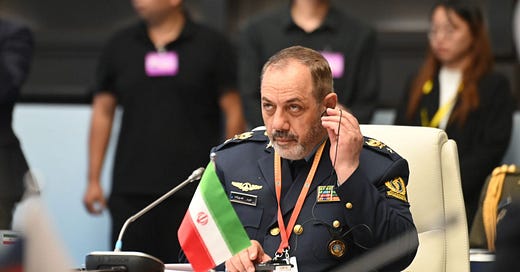Chinese, Russian, Iranian Defense Ministers Meet in Qingdao during SCO
Just days after Iran and Israel agreed to a fragile ceasefire brokered by the United States, Iran’s Defense Minister General Aziz Nasirzadeh arrived in Qingdao on June 25 to join his Russian and Chinese defense counterparts for a high-profile trilateral dialogue. The meeting was timely, occurring at the same time as the U.S.-NATO summit in Europe. Facing mounting to return to nuclear negotiations, Iran is looking to China for diplomatic cover and as a signal that Tehran still has powerful friends as it recalibrates its Middle East posture.
For Tehran, this visit aimed to secure Chinese political support as it enters a precarious new phase. Iran has been weakened militarily, diplomatically cornered, and faces an intense internal debate over whether to double down on confrontation or return to talks. Iranian leaders also seem to hope that Chinese backing may help rehabilitate its image on the international stage—despite having sidelined Beijing earlier this year in pursuit of a direct nuclear track with Washington.
For Beijing, the visit was more complicated. Iran’s embrace offers China influence—particularly in shaping Tehran’s next steps—but it also carries real risks. While China maintains significant economic interests in Iran, it has no intention of being pulled into the country’s volatile orbit. The Qingdao summit was emblematic of this tension. It served as a performance of strategic solidarity with Iran and Russia, but was carefully orchestrated to avoid any substantive entanglement or substantive security commitments.
This strategic caution is mirrored in public commentary inside China. One widely Chinese commentator captured the skepticism some Chinese observers express toward Iran’s intentions:
“Iran is seeking China’s friendship when convenient—but China must avoid being used as a pawn in Tehran’s political maneuvering.”
(“伊朗在需要时寻求中国的友谊——但中国必须避免被德黑兰当作棋子来利用。”)“Peace and development in the Middle East are in China’s interest, but not at the cost of being dragged into someone else’s war.”
(“中东的和平与发展符合中国的利益,但不能以被卷入别人的战争为代价。”)
These comments reflect a degree of wariness in Chinese policy discourse. Beijing sees opportunity in Iran’s diplomatic outreach, but Chinese officials are not blind to the risks of entanglement, especially as they get closer to a final deal with President Trump. That cautious posture shaped the tone and substance of the Qingdao summit itself.
Rather than engaging on difficult issues like Iran’s nuclear program or the prospects of renewed negotiations, the meeting largely resulted in sharp criticism of the United States, Israel, and the West. Chinese Defense Minister Dong Jun described their meeting as “a strategic counterbalance amid rising global tensions,” referencing not only the Israel–Iran war but also NATO’s evolving defense posture. He warned that “chaos and instability” are being stoked by Western unilateralism—a line echoed by Russia’s Defense Minister Andrei Belousov, who framed the gathering as a response to rising global friction. Through the Shanghai Cooperation Organisation (SCO), Beijing sought to present itself as a diplomatic alternative to Western-led security frameworks.
Yet beneath the optics of solidarity, China remains cautious. Beijing continues to draw a firm line on nuclear proliferation, an indirect criticism of Iran’s pursuit of a nuclear bomb. In an interview with the
, Chinese foreign policy scholar and former PLA member Zhang Tuosheng argued:“Any new nuclear state in the Middle East would severely destabilize the region and challenge the NPT framework…China absolutely supports Iran’s right to peaceful nuclear energy—but resolutely opposes its weaponization.”
My takeaway from the Qingdao summit:
Beijing wants to shape outcomes in the Middle East without inheriting ownership of the region’s instability–a position Chinese officials keep finding themselves in. It is a tricky spot. China could give Iran political space and economic lifelines, but even these seem risky. Beijing will almost certainly not cross the threshold into military intervention or involvement, but still holds quiet leverage. It is still Iran’s lifeline. Its oil purchases and infrastructure investments give it economic influence that, when paired with Western engagement, may help shape Iranian behavior and create a diplomatic opening.




